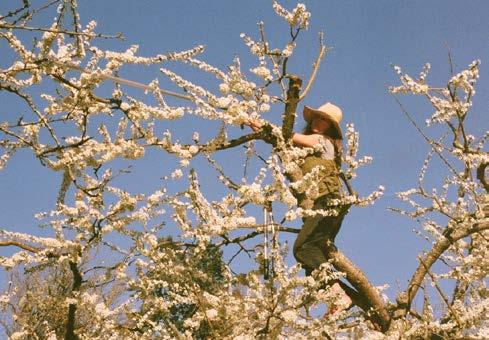
4 minute read
Foundation Programs A Bright Future for Organic Is a Bright Future for All
by Adrian Fischer
We all want a bright future for ourselves, our children, and future generations. It’s exhilarating and daunting to think of the ways we can effect change to progress, individually and as a society. As an organization, the CCOF Foundation advances organic because we know it’s helping to build a better tomorrow.
So, it’s exciting that the USDA is now investing in expanding organic transition and giving organic a chance to make the difference it has always promised by encouraging farmers to convert as much production land as possible into organic as soon as possible. It’s an ambitious, multipronged goal with enormous positive potential which you can learn more about at www.ccof.org/roadmap bolster organic knowledge and advisory capacity for agents in Resource Conservation Districts, university extension offices, Farm Service Agencies, Certified Crop Advisors, and other consultants and TA providers. We must support longstanding organic networks and conferences like EcoFarm, Northeast Organic Farming Association (NOFA), Marbleseed, Maine Organic Farmers and Gardeners (MOFGA) and others that have been instrumental in building the organic community, while embracing organizations and groups that are doing their best to push the needle forward with ecological practices but need support to go organic.
Under the USDA’s Transition to Organic Partnership Program (TOPP), the CCOF Foundation leads the West/Southwest region encompassing Texas, Utah, New Mexico, Arizona, Nevada, California, and Hawaii. In concert with the other five regional leads across the United States, we are coordinating with dozens of partners to support organic transition through mentorship, technical assistance (TA), workforce development, and community building. From national organizations with broad reach to universities with statelevel reach to local nonprofit organizations, together we are bolstering capacity to support producers.
In some communities and for some farmers where organic transition is further on the horizon, a necessary first step is demystifying organic and building trust with folks who have historically been omitted from organic. We’re listening to different communities’ needs and adapting to best nurture their organic transition paths. This means offering and joining events where folks can learn more about organic and providing different diverse entries to engagement and commitment—because we know going organic can be challenging, not only in terms of production practices but also socio-culturally. Using different languages and visual, hands-on, and farmer-to-farmer learning, we can engage folks in many ways. The intention is to make organic accessible to all.
Through our research, we have identified myriad barriers to organic transition. That’s why we are customizing our approach to addressing these barriers. In some regions, a lack of organic inspectors and other workforce limitations present barriers; similarly, there are bottlenecks or fissures in the organic supply chain related to meat processing and organic feed hay for livestock and dairy producers. More producers need more markets, and while the Organic Market Development Grant centers on this scope, we’re boosting the effort by co-creating pathways for value-based supply chain careers and growth along the supply chain. We are also working on pathways on the demand side of the equation to provide for farmers in exchange for the valuable ecosystem services they provide for us and our planet.
Passing on knowledge must occur in a variety of forms, and few are as important as farmers teaching one another. That’s why we’re building an ambitious mentorship program inviting seasoned organic farmers to be mentors for transitioning farmers locally and across the West/Southwest region and in partnership with other regional leads across the United States.
Learn more about mentorship opportunities on the CCOF website at www.ccof.org/topp and www.organictransitions. org
Transition comes with risks as people learn new systems, markets develop, and soil regenerates; to mitigate some of those risks we need to streamline, diversify, and expand programs like the Transitional and Organic Grower Assistance Program and the Organic Certification Cost Share Program. These risks are particularly acute for underserved and smaller-scale producers, and—as we highlighted in our last Certified Organic magazine issue—that’s why the CCOF Foundation provides direct financial assistance for transition through our Organic Transition Grants program.
Learn more about our organic transition grants at www.ccof. org/organic-transition
To effectively support all who want to transition, we are harnessing and advancing the collective knowledge and capacity of veteran organic producers, technical assistance providers, researchers, institutions, certifying bodies, community organizations, and other stakeholders. While we applaud the initiatives through the National Resource Conservation Service that create positions for organic expertise in each of its regional centers, we also need to
To ensure a net increase in organic acreage, we need current organic farmers to thrive. At times, this means supporting them financially through hardship or disaster. The CCOF Foundation’s Hardship Assistance Fund continues to expand support for folks in need with almost $1.2 million awarded to date and plans to award at least another $2.7 million in the next two years. The hardship assistance grants make an enormous difference for farmers who are weathering tough times like the organic dairy crisis, fires, drought, and flooding.
PhotocourtesyofRachelFuller,FutureOrganicFarmerGrantee
Learn more about hardship assistance at www.ccof.org/ hardship
Yet another fundamental consideration in transitioning more acres to organic is supporting the next generation of organic producers, which is why the CCOF Foundation created and continues to grow our Future Organic Farmers (FOF) grant fund. With almost $800,000 in awards, this fund is driven by individuals like you and businesses with the vision to invest in our bright tomorrow. As one of 2023’s FOF grantees, Angelina Oliva writes, “When I think of a future in farming, I see a family who works together, who is knitted with their local community and its needs, who advocates and fights for equity and environmental soundness, and who feeds people, both physically and with transformational knowledge.” She adds, “To my family, organic agriculture, distinguished by regenerative practices, is the only way to move forward in the field of agriculture.”
Learn more about these grants at www.ccof.org/fof
To reap the benefits of organic and amplify its healing capacity to all communities, we need to nourish it in many ways. This takes a collective effort, lifting the voices of all current stakeholders and inviting new ones to the table. It will take opening hearts and minds, more patience and compassion, and continued resolve and resilience. The CCOF Foundation is thrilled and honored to be one of the leaders in coordinating and propelling organic expansion through our programming and the collective efforts of all our partners.

See the list of all our current partners and national organizations involved in TOPP at www.ams.usda.gov/sites/ default/files/media/TOPPMap.pdf
Donate to the CCOF Foundation at www.ccof.org/donate







